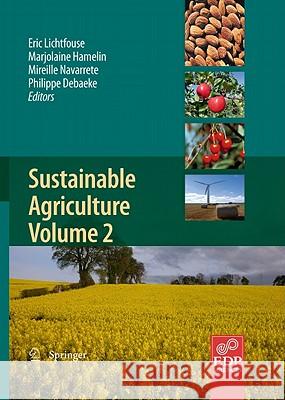Sustainable Agriculture Volume 2 » książka



Sustainable Agriculture Volume 2
ISBN-13: 9789400703933 / Angielski / Twarda / 2011 / 992 str.
Sustainable Agriculture Volume 2
ISBN-13: 9789400703933 / Angielski / Twarda / 2011 / 992 str.
(netto: 1265,18 VAT: 5%)
Najniższa cena z 30 dni: 1272,31
ok. 16-18 dni roboczych.
Darmowa dostawa!
This collection of review articles analyzes current agricultural issues and knowledge, and proposes alternatives. It will help scientists, professors, farmers and politicians trying to build a safe agriculture, energy and food system for future generations.
SECTION 1 - NOVEL CONCEPTS
Emerging agroscience; Ants and sustainable agriculture; Agroecology as a science, a movement and a practice; Adaptiveness to enhance the sustainability of farming systems; Economics of biosecurity across levels of decision-making; Describing and locating cropping systems on a regional scale
SECTION 2 - FOOD SECURITY
Nutritional quality and safety of organic food; Minerals in plant food: effect of agricultural practices and role in human health; Fertiliser trees for sustainable food security in the maize-based production systems of East and Southern Africa; Cereal landraces for sustainable agriculture; Mineral sources of potassium for plant nutrition; Glandless seed and glanded plant research in cotton; Micronutrient-efficient genotypes for crop yield and nutritional quality in sustainable agriculture; Multi-criteria decision models for management of tropical coastal fisheries
SECTION 3 - SOCIOLOGY AND ECONOMICS
Farmer responses to climate change and sustainable agriculture; The use of the marasha ard plough for conservation agriculture in Northern Ethiopia; Biological nitrogen fixation and socioeconomic factors for legume production in sub-Saharan Africa; Conventionalisation of organic farming practices: from structural criteria towards an assessment based on organic principles; Conservation tillage in Turkish dryland research
SECTION 4 - CLIMATE CHANGE
Biofuels, greenhouse gases and climate change; Agronomic and physiological performances of different species of Miscanthus, a major energy crop; Changes in atmospheric chemistry and crop health; Modelling soil carbon and nitrogen cycles during land use change; Greenhouse gases and ammonia emissions from organic mixed crop-dairy systems: a critical review of mitigation options; Water deficit and nitrogen nutrition of crops; Validation of biophysical models: issues and methodologies; Cold stress tolerance mechanisms in plants
SECTION 5 - ALTERNATIVE PEST CONTROL
Defence mechanisms of Brassicaceae: implications for plant-insect interactions and potential for integrated pest management; Ionising radiation and area-wide management of insect pests to promote sustainable agriculture; Biodiversity and pest management in orchard systems; Pathogenic and beneficial microorganisms in soilless cultures; Allelopathy in Compositae plants
SECTION 6 - SOIL HEALTH
Assessing the productivity function of soils; Long-term effects of organic amendments on soil fertility; Tillage management effects on pesticide fate in soils; Sustainable cow-calf operations and water quality; Biogeography of soil microbial communities: a review and a description of the ongoing french national initiative
SECTION 7 - ALTERNATIVE FERTILISATION
Nitrogen rhizodeposition of legumes; Models of biological nitrogen fixation of legumes; Arbuscular mycorrhizal networks: process and functions; Efficient N management using winter oilseed rape; Improving nitrogen fertilization in rice by site-specific N management; Solid–liquid separation of animal slurry in theory and practice
Sustainability rests on the principle that we must meet the needs of the present without compromising the ability of future generations to meet their own needs. Starving people in poor nations, obesity in rich nations, increasing food prices, on-going climate changes, increasing fuel and transportation costs, flaws of the global market, worldwide pesticide pollution, pest adaptation and resistance, loss of soil fertility and organic carbon, soil erosion, decreasing biodiversity, desertification, and so on. Despite unprecedented advances in sciences allowing to visit planets and disclose subatomic particles, serious terrestrial issues about food show clearly that conventional agriculture is not suited any longer to feed humans and to preserve ecosystems. Sustainable agriculture is an alternative for solving fundamental and applied issues related to food production in an ecological way. While conventional agriculture is driven almost solely by productivity and profit, sustainable agriculture integrates biological, chemical, physical, ecological, economic and social sciences in a comprehensive way to develop new farming practices that are safe and do not degrade our environment. In that respect, sustainable agriculture is not a classical and narrow science. Instead of solving problems using the classical painkiller approach that treats only negative impacts, sustainable agriculture treats problem sources. As most actual society issues are now intertwined, global, and fast-developing, sustainable agriculture will bring solutions to build a safer world.
This book gathers review articles that analyze current agricultural issues and knowledge, then propose alternative solutions. It will therefore help all scientists, decision-makers, professors, farmers and politicians who wish to build a safe agriculture, energy and food system for future generations.
This book gathers review articles that analyze current agricultural issues and knowledge, then propose alternative solutions. It will therefore help all scientists, decision-makers, professors, farmers and politicians who wish to build a safe agriculture, energy and food system for future generations.
1997-2026 DolnySlask.com Agencja Internetowa
KrainaKsiazek.PL - Księgarnia Internetowa









